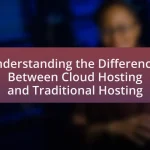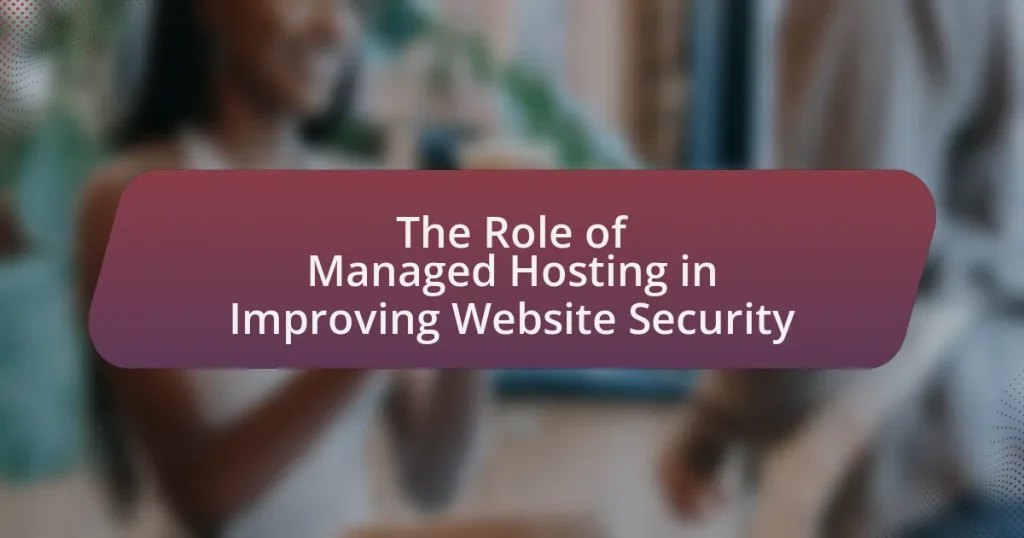Managed hosting is a service where hosting providers manage, maintain, and secure servers for clients, playing a vital role in enhancing website security. This article outlines how managed hosting improves security through features such as regular updates, firewalls, DDoS protection, and expert monitoring, significantly reducing vulnerabilities and the risk of cyberattacks. It also discusses the importance of website security for businesses, the consequences of poor security, and the specific measures implemented by managed hosting providers to protect sensitive data. Additionally, the article highlights best practices for businesses when selecting managed hosting services, emphasizing the need for robust security features and compliance with industry standards.
What is Managed Hosting and Its Role in Website Security?
Managed hosting is a service where a hosting provider takes care of the management, maintenance, and security of a server or group of servers for a client. This service plays a crucial role in website security by offering features such as regular security updates, monitoring for vulnerabilities, and implementing firewalls. For instance, managed hosting providers often deploy advanced security measures like intrusion detection systems and DDoS protection, which significantly reduce the risk of cyberattacks. Additionally, they typically include automated backups and disaster recovery solutions, ensuring that data is protected and can be restored quickly in case of a breach. These comprehensive security protocols provided by managed hosting services enhance the overall security posture of websites, making them less susceptible to threats.
How does Managed Hosting enhance website security?
Managed Hosting enhances website security by providing dedicated resources and expert management that include regular security updates, monitoring, and proactive threat detection. This environment minimizes vulnerabilities by ensuring that the server infrastructure is consistently patched and updated against the latest security threats. Additionally, Managed Hosting often includes features such as firewalls, DDoS protection, and secure data backups, which collectively strengthen the overall security posture of the website. According to a report by the Ponemon Institute, organizations that utilize managed services experience 50% fewer security incidents compared to those that manage their own infrastructure, highlighting the effectiveness of Managed Hosting in safeguarding websites.
What security features are typically included in Managed Hosting services?
Managed Hosting services typically include security features such as firewalls, DDoS protection, regular backups, malware scanning, and SSL certificates. These features work together to safeguard websites from various threats. For instance, firewalls monitor and control incoming and outgoing network traffic based on predetermined security rules, while DDoS protection mitigates the impact of distributed denial-of-service attacks. Regular backups ensure data recovery in case of loss, and malware scanning detects and removes harmful software. SSL certificates encrypt data transmitted between the server and users, enhancing data security. These integrated security measures are essential for maintaining a secure online presence.
How do these features protect against common security threats?
Managed hosting features protect against common security threats by implementing robust security protocols, regular updates, and proactive monitoring. These features include firewalls, intrusion detection systems, and DDoS protection, which collectively mitigate risks from unauthorized access, data breaches, and service disruptions. For instance, firewalls filter incoming and outgoing traffic based on predetermined security rules, effectively blocking malicious attempts to access the server. Regular updates ensure that software vulnerabilities are patched promptly, reducing the risk of exploitation. Proactive monitoring allows for real-time detection of suspicious activities, enabling swift responses to potential threats. Together, these measures create a comprehensive security framework that significantly enhances website protection against prevalent security threats.
Why is website security crucial for businesses?
Website security is crucial for businesses because it protects sensitive data, maintains customer trust, and ensures compliance with regulations. A breach can lead to significant financial losses; for instance, the average cost of a data breach in 2023 was estimated at $4.45 million, according to IBM’s Cost of a Data Breach Report. Additionally, compromised websites can damage a company’s reputation, leading to lost customers and decreased revenue. Therefore, robust website security measures are essential for safeguarding assets and sustaining business operations.
What are the potential consequences of poor website security?
Poor website security can lead to significant consequences, including data breaches, financial loss, and damage to reputation. Data breaches can expose sensitive customer information, resulting in identity theft and legal liabilities for businesses. Financial loss can occur through direct theft, fraud, or the costs associated with remediation efforts after an attack; for instance, the average cost of a data breach in 2023 was estimated at $4.45 million according to IBM’s Cost of a Data Breach Report. Additionally, a compromised website can lead to a loss of customer trust, which can severely impact a company’s reputation and lead to decreased sales and customer retention.
How can Managed Hosting mitigate these risks?
Managed Hosting can mitigate risks by providing dedicated security measures, expert management, and regular updates. These services include firewalls, intrusion detection systems, and data encryption, which protect against unauthorized access and data breaches. Additionally, managed hosting providers often employ security professionals who monitor systems 24/7, ensuring rapid response to potential threats. Regular software updates and patches are also implemented to address vulnerabilities, significantly reducing the risk of exploitation. According to a study by the Ponemon Institute, organizations using managed hosting services experience 50% fewer security incidents compared to those managing their own infrastructure.
What are the Key Benefits of Managed Hosting for Website Security?
Managed hosting significantly enhances website security by providing dedicated resources, expert management, and proactive monitoring. This type of hosting ensures that security measures are consistently updated and maintained, reducing vulnerabilities. Managed hosting providers typically implement advanced security protocols, including firewalls, intrusion detection systems, and regular security audits, which collectively strengthen the overall security posture of the hosted websites. Additionally, the expertise of managed hosting teams allows for rapid response to security incidents, minimizing potential damage and downtime. According to a study by the Ponemon Institute, organizations using managed hosting services experience 50% fewer security breaches compared to those relying on self-managed solutions, highlighting the effectiveness of managed hosting in safeguarding websites.
How does Managed Hosting improve data protection?
Managed Hosting improves data protection by providing dedicated resources and expert management that enhance security measures. This type of hosting typically includes regular backups, advanced firewalls, and intrusion detection systems, which collectively safeguard sensitive data from breaches and loss. Additionally, managed hosting providers often comply with industry standards and regulations, such as GDPR and PCI DSS, ensuring that data protection practices are robust and up-to-date. This structured approach to security minimizes vulnerabilities and enhances overall data integrity.
What backup solutions are offered by Managed Hosting providers?
Managed Hosting providers typically offer automated backups, offsite storage, and incremental backup solutions. Automated backups ensure that data is regularly saved without manual intervention, reducing the risk of data loss. Offsite storage provides an additional layer of security by keeping backups in a separate location, safeguarding against local disasters. Incremental backups allow for efficient storage by only saving changes made since the last backup, optimizing both time and space. These solutions collectively enhance website security by ensuring data integrity and availability in case of failures or attacks.
How do these solutions ensure data integrity and availability?
Managed hosting solutions ensure data integrity and availability through robust security measures and redundancy protocols. These solutions implement regular data backups, which protect against data loss and corruption, ensuring that the most recent and accurate data is always accessible. Additionally, managed hosting providers utilize advanced monitoring systems that detect and respond to potential threats in real-time, thereby maintaining the integrity of the data. Furthermore, redundancy measures, such as data replication across multiple servers, enhance availability by ensuring that if one server fails, another can take over without service interruption. This combination of proactive security and redundancy effectively safeguards data integrity and ensures continuous availability.
What role does expert support play in Managed Hosting security?
Expert support is crucial in Managed Hosting security as it provides specialized knowledge and proactive measures to protect against threats. Managed Hosting providers employ security experts who continuously monitor systems, implement security protocols, and respond to incidents, ensuring a robust defense against cyberattacks. For instance, according to a report by Cybersecurity Ventures, global cybercrime costs are projected to reach $10.5 trillion annually by 2025, highlighting the importance of expert intervention in mitigating risks. This expertise not only enhances the security posture of hosted environments but also ensures compliance with industry standards and regulations, further safeguarding sensitive data.
How can 24/7 monitoring enhance website security?
24/7 monitoring enhances website security by providing continuous oversight of website activities, allowing for the immediate detection and response to potential threats. This proactive approach minimizes the risk of data breaches and cyberattacks, as vulnerabilities can be identified and addressed in real-time. According to a report by IBM, organizations with continuous monitoring can reduce the average time to identify a breach from 207 days to just 66 days, significantly limiting the potential damage.
What expertise do Managed Hosting providers offer in threat detection?
Managed Hosting providers offer expertise in threat detection through advanced monitoring systems, real-time analytics, and proactive security measures. These providers utilize sophisticated tools such as intrusion detection systems (IDS) and security information and event management (SIEM) solutions to identify and respond to potential threats swiftly. For instance, a study by the Ponemon Institute found that organizations using managed security services experienced a 50% reduction in the time to detect and respond to security incidents. This demonstrates the effectiveness of Managed Hosting providers in enhancing threat detection capabilities, ensuring a more secure hosting environment for their clients.
What Specific Security Measures are Implemented in Managed Hosting?
Managed hosting implements several specific security measures, including firewalls, intrusion detection systems, regular security audits, and data encryption. Firewalls protect against unauthorized access by filtering incoming and outgoing traffic based on predetermined security rules. Intrusion detection systems monitor network traffic for suspicious activity and alert administrators to potential threats. Regular security audits assess the effectiveness of security protocols and identify vulnerabilities. Data encryption ensures that sensitive information is securely transmitted and stored, making it unreadable to unauthorized users. These measures collectively enhance the overall security posture of managed hosting environments, safeguarding client data and maintaining compliance with industry standards.
How do firewalls and intrusion detection systems work in Managed Hosting?
Firewalls and intrusion detection systems (IDS) in managed hosting work by monitoring and controlling incoming and outgoing network traffic to protect hosted environments from unauthorized access and threats. Firewalls act as a barrier between trusted internal networks and untrusted external networks, filtering traffic based on predefined security rules. They can block or allow data packets based on IP addresses, protocols, and ports, effectively preventing malicious traffic from reaching the hosted servers.
Intrusion detection systems complement firewalls by analyzing network traffic for suspicious activity and potential threats. IDS can identify patterns that indicate a security breach, such as unusual traffic spikes or known attack signatures. When a potential threat is detected, the IDS can alert administrators or take predefined actions to mitigate the risk.
The effectiveness of firewalls and IDS in managed hosting is supported by industry standards and best practices, such as the National Institute of Standards and Technology (NIST) guidelines, which emphasize the importance of layered security measures to protect sensitive data and maintain system integrity.
What types of firewalls are commonly used in Managed Hosting?
The types of firewalls commonly used in Managed Hosting include hardware firewalls, software firewalls, and next-generation firewalls. Hardware firewalls are physical devices that protect the network by filtering traffic at the perimeter, while software firewalls are applications installed on servers to monitor and control incoming and outgoing traffic. Next-generation firewalls combine traditional firewall capabilities with advanced features such as intrusion prevention, application awareness, and deep packet inspection, enhancing security measures. These firewalls are essential in Managed Hosting environments to safeguard against cyber threats and ensure data integrity.
How do intrusion detection systems identify and respond to threats?
Intrusion detection systems (IDS) identify and respond to threats by monitoring network traffic and system activities for suspicious behavior. They utilize various techniques, such as signature-based detection, which compares incoming data against known threat signatures, and anomaly-based detection, which establishes a baseline of normal behavior to identify deviations. When a potential threat is detected, the IDS can respond by alerting administrators, logging the event, or taking automated actions like blocking the offending traffic. This proactive approach helps organizations mitigate risks and enhance their overall security posture.
What is the importance of regular updates and patches in Managed Hosting?
Regular updates and patches in Managed Hosting are crucial for maintaining security and performance. These updates address vulnerabilities that could be exploited by cyber threats, thereby reducing the risk of data breaches and system failures. For instance, a report by the Ponemon Institute indicates that 60% of data breaches are linked to unpatched vulnerabilities. Additionally, regular updates enhance system stability and compatibility with new technologies, ensuring optimal performance. Therefore, the importance of these updates lies in their role in safeguarding sensitive information and ensuring the smooth operation of hosted services.
How do updates protect against vulnerabilities?
Updates protect against vulnerabilities by patching security flaws and bugs in software. When developers identify vulnerabilities, they create updates that address these issues, thereby reducing the risk of exploitation by malicious actors. For instance, a study by the Ponemon Institute found that 60% of data breaches occur due to unpatched vulnerabilities, highlighting the critical role of updates in maintaining security. Regularly applying updates ensures that systems are fortified against known threats, thereby enhancing overall website security in managed hosting environments.
What processes are in place for ensuring timely updates?
Timely updates are ensured through automated patch management systems and regular monitoring protocols. Managed hosting providers implement automated tools that regularly check for software updates and security patches, applying them promptly to minimize vulnerabilities. Additionally, these providers often have dedicated teams that monitor system performance and security, ensuring that updates are not only applied but also tested for compatibility and effectiveness. This proactive approach is supported by industry standards, such as the National Institute of Standards and Technology (NIST) guidelines, which emphasize the importance of timely updates in maintaining cybersecurity.
What best practices should businesses follow when choosing Managed Hosting?
Businesses should prioritize security features, support, and scalability when choosing Managed Hosting. Security features such as DDoS protection, firewalls, and regular backups are essential to safeguard sensitive data and maintain website integrity. Reliable support ensures that any issues can be promptly addressed, minimizing downtime and potential security vulnerabilities. Scalability allows businesses to adapt to changing traffic demands without compromising performance or security. According to a report by Gartner, organizations that implement robust managed hosting solutions experience a 30% reduction in security incidents, highlighting the importance of these best practices in enhancing website security.
How can businesses assess the security features of Managed Hosting providers?
Businesses can assess the security features of Managed Hosting providers by evaluating their compliance with industry standards, such as ISO 27001 and PCI DSS, which indicate a commitment to security best practices. Additionally, reviewing the provider’s security protocols, including firewalls, intrusion detection systems, and data encryption methods, is essential. Businesses should also inquire about the provider’s incident response plan and the frequency of security audits. Furthermore, examining customer reviews and case studies can provide insights into the provider’s reliability and effectiveness in handling security threats.
What questions should businesses ask potential Managed Hosting providers?
Businesses should ask potential Managed Hosting providers about their security protocols, including data encryption methods, firewall configurations, and intrusion detection systems. Understanding the specific security measures in place is crucial, as 43% of cyberattacks target small businesses, highlighting the need for robust protection. Additionally, inquiries about compliance with industry standards, such as GDPR or PCI DSS, are essential to ensure that the provider meets necessary legal and regulatory requirements. Furthermore, businesses should ask about the provider’s incident response plan, including how quickly they can respond to a security breach, as timely action can significantly mitigate damage. Lastly, it is important to inquire about regular security audits and updates to ensure that the hosting environment remains secure against evolving threats.










